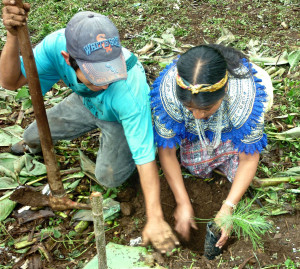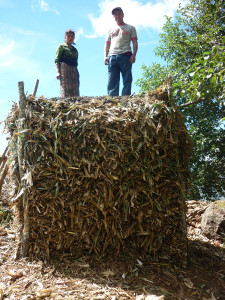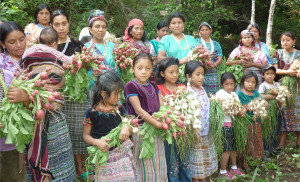An Update from the FUNDAMARCOS’ 2015 Agricultural Year
The following are from the FUNDAMARCOS Sustainable Agricultural and Primary Health Program’s work with 11 Villages in Cubulco and Granados, Baja Verapaz from 2014-2015:
Tree Planting

Mother and son transplanting a small pine tree.
29,443 total trees planted
20,097 small trees transplanted onto the hillsides for reforestation, firewood and lumber – 9 varieties selected to be appropriate for the elevation where they were planted.
2,084 fruit trees planted – 21 different kinds of fruit. The selection of trees was determined according to the elevation of the farm and the eating preferences of the family planting them.
7,262 shade protected coffee trees planted in contour rows.
Most of the seedlings are started by FUNDAMARCOS farmer groups in community seedbed nurseries. The seedings are then transplanted into growing bags before finally being transplanted into the ground on an individual family’s land. This is all done by the farmers themselves which increases commitment to care for the trees. Seldom do farmers receive seedlings that are ready to plant. Learning to grow trees from seed, many of which participants have collected themselves, builds self-reliance and thus sustainability.

Compost piles can be large!
Implementation of Soil and Water Conservation Practices
32,179 new linear meters of contours were laid out to prepare for contour planting. (This is more than 32 kilometers!) One use of these contours has been to plant them with coffee trees and accompanying shade trees.
17,599 meters of grass conservation barriers were planted on the contours. With time this type of grass barrier will create bench terraces. Conservation barriers also sequester nutrients.
457 meters of stone walls were built on the contour. These will create terraces.
1,296 meters of contour ditches were dug for water management.
122 farm families constructed their own A-Frames for determining contour lines.
Organic Fertilization
99 families have built large compost piles.
10 groups of women built very large compost piles for their communal gardens.
23 families are raising worms for fertilizer (vermiculture).
55 cuerdas of cover crop legumes were planted to enrich the soil with nitrogen. (Cuerda = 20 meters x 20 meters)
Practically all participating families have created methods for collecting the manure from their chickens or other domestic animals to fertilize family vegetable gardens, fruit trees, and other crops.
Crop rotation and intercropping are practiced by most participants in the FUNDAMARCOS program. For instance, corn is commonly planted first and beans, which are legumes, are later interplanted with the corn.
 Vegetable Gardens
Vegetable Gardens
143 women had individual vegetable gardens which were organically fertilized and protected from pests with homemade organic insecticides.
10 women’s groups have large communal vegetable gardens fertilized organically with compost produced at the site and protected from pests with organic insecticides made by the women.
6 gardens of medicinal herbs – 4 women’s groups have communal gardens and are learning to prepare herbal medicines and 2 individual families have medicinal herb gardens.
Livestock Production for Food and Transportation
7,676 chickens vaccinated. This number includes both the chickens of regular program participants
and other village chickens vaccinated during vaccination campaigns.
108 cows vaccinated.
107 horses vaccinated.
One FUNDAMARCOS staff person now gives classes on animal health to the FUNDAMARCOS farmer groups of both men and women. He also has a basic selection of veterinary medicines and can visit a farm to treat many of the most common livestock diseases.
Some households have planted pasture grasses or fodder trees. Most families with livestock – cows, horses or chickens – have planted grass conservation barriers that both reduce hillside erosion and provide food for their animals. Multi-purpose practices like this are strongly promoted by the program.
Information taken from 310 participant surveys – 241 families (Download PDF)
- Farmers grow seedlings one year for planting the next year. More seedlings ready for planting next year.



